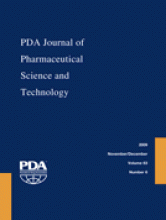Abstract
The manufacture and supply of pharmaceutical products can be a very complex operation. Companies may purchase a wide variety of materials, from active pharmaceutical ingredients to packaging materials, from “in company” suppliers or from third parties. They may also purchase or contract a number of services such as analysis, data management, audit, among others. It is very important that these materials and services are of the requisite quality in order that patient safety and company reputation are adequately protected. Such quality requirements are ongoing throughout the product life cycle.
In recent years, assurance of quality has been derived via audit of the supplier or service provider and by using periodic audits, for example, annually or at least once every 5 years. In the past, companies may have used an audit only for what they considered to be “key” materials or services and used testing on receipt, for example, as their quality assurance measure for “less important” supplies. Such approaches changed as a result of pressure from both internal sources and regulators to the time-driven audit for all suppliers and service providers. Companies recognised that eventually they would be responsible for the quality of the supplied product or service and audit, although providing only a “snapshot in time” seemed a convenient way of demonstrating that they were meeting their obligations. Problems, however, still occur with the supplied product or service and will usually be more frequent from certain suppliers. Additionally, some third-party suppliers will no longer accept routine audits from individual companies, as the overall audit load can exceed one external audit per working day. Consequently a different model is needed for assessing supplier quality.
This paper presents a risk-based approach to creating an audit plan and for scheduling the frequency and depth of such audits. The approach is based on the principles and process of the Quality Risk Management guideline (ICH Q9) of the International Conference on Harmonisation (ICH). It proposes that if regulatory conditions allow, it may be possible to remove the need to conduct audits on the sole basis of time elapsed since the last audit, or at least to increase the time interval between such audits without compromising either patient safety or company reputation. The proposal is equally applicable to both large and small companies. Small companies may find it particularly useful in cases where they use a supplier that may have a monopoly position or that serves many other pharmaceutical companies. In such circumstances the supplier may be reluctant or even refuse to accept audits from some individual companies because of their low purchasing levels. A similar approach could be proposed for regulatory authorities for the scheduling of regulatory inspections.
- © PDA, Inc. 2009
PDA members receive access to all articles published in the current year and previous volume year. Institutional subscribers received access to all content. Log in below to receive access to this article if you are either of these.
If you are neither or you are a PDA member trying to access an article outside of your membership license, then you must purchase access to this article (below). If you do not have a username or password for JPST, you will be required to create an account prior to purchasing.
Full issue PDFs are for PDA members only.
Note to pda.org users
The PDA and PDA bookstore websites (www.pda.org and www.pda.org/bookstore) are separate websites from the PDA JPST website. When you first join PDA, your initial UserID and Password are sent to HighWirePress to create your PDA JPST account. Subsequent UserrID and Password changes required at the PDA websites will not pass on to PDA JPST and vice versa. If you forget your PDA JPST UserID and/or Password, you can request help to retrieve UserID and reset Password below.






